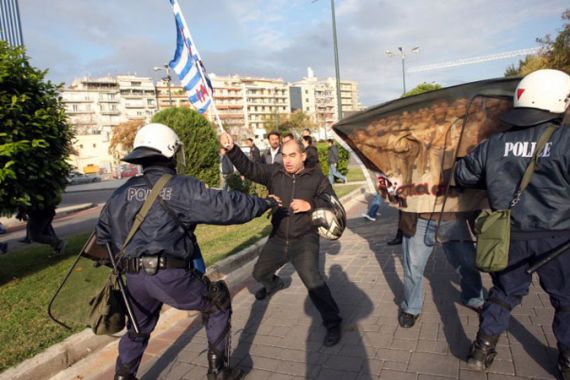Greek workers storm German meeting
Protesters blame German lenders for forcing budget cuts in exchange for bailouts.

Greek workers have stormed a meeting of Greek and German officials in the northern city of Thessaloniki in protest at ongoing economic austerity measures they believe to be imposed on the country by international lenders.
Protesters also jostled a German diplomat at the summit on Thursday, throwing coffee on him.
“These people haven’t come here to help us, but to announce our death sentence,” said Themis Balasopoulos, leader of Greece’s municipal workers union.
The scuffles broke out as the Greek government announced that it had sold a further $1.2bn-worth of Treasury bills to repay maturing debts.
Police used truncheons and teargas to disperse around 250 city employees, after several burst into the conference centre where the meeting was being held. Workers had run through its halls, shouting obscenities, in an attempt to stop the meeting aimed at smoothing ties between Athens and Berlin.
Riot police formed a shield around German Consul Wolfgang Hoelscher-Obermaier and fought off protesters who tried to attack him as he entered the building. Some demonstrators reportedly tried to pelt him with water bottles.
More than 200 protesters thronged outside the building, chanting: “It’s now or never”, and held up mock gravestones and banners proclaiming” “Fight until the end!”
“Stand united to kick out the Nazis,” some protesters also chanted.
The protesters found an ally in left-wing German lawmaker Annette Groth, who joined them outside the conference centre.
“I have also been unemployed,” she told the crowd. “It is not you who should pay the price for this crisis but the rich.”
Bad blood
In Greece, many people worn down by years of austerity blame German Chancellor Angela Merkel for forcing painful cuts to Greek social spending in exchange for two international bailout packages.
In Germany, meanwhile, some media agencies have long characterised the Mediterranean state’s 11 million people as lazy, corrupt and ungrateful.
German officials also accused Greece of dragging its feet on reforms and wasting precious time bought by EU-IMF loans, to which Berlin is a major contributor.
Only Wednesday last week, German deputy labour minister Hans-Joachim Fuchtel enraged many Greeks when he said that three Greek municipal staffers were required to complete tasks accomplished by a single German.
“Studies show that 3,000 employees are required in Greece for local administration work carried out by 1,000 people in Germany,” Fuchtel said.
Greek views on Germany, still tainted by the passed-down memory of a brutal occupation by Nazi forces during World War II, have been further strained by the eurozone crisis.
In October, around 50,000 protesters clashed with police while some burned Nazi flags when Merkel visited Athens.
Greeks have stepped up protests in recent weeks against the austerity measures that Athens promised its lenders, the European Union and the International Monetary Fund, in return for the aid keeping the nation afloat.
The German embassy was not immediately reachable for comment, while an employee at the Thessaloniki city hall said no one was able to respond to a request for comment.
Outstanding debt
Amid the protest, another deadline looms for Greece to pay off its debts.
To afford the repayment, Greece auctioned four-week and 13-week Treasury bills on Tuesday and continued to accept bids until Thursday, raising a total of $6.4bn.
It was essential for the debt-ridden country to raise these funds this week, as its next bailout rescue loan from other eurozone countries and the International Monetary Fund is not expected until the end of the month.
Without the money raised this week, Greece would have faced bankruptcy on Friday, the day on which Treasury bills it issued in August will mature.
In Bratislava, Slovak Prime Minister Robert Fico said his country did not favour extending Greece’s financial deadline.
“We are not keen to grant Greece more time, nor further (debt) writedowns. Greece must ‘pay the price’ first and then we can help them,” he said.
“I don’t want to be an extremist politician who would want to kick someone out from somewhere.”